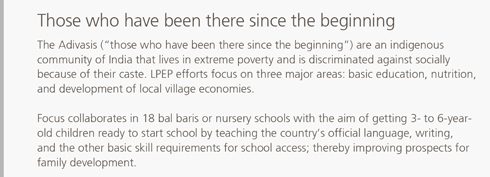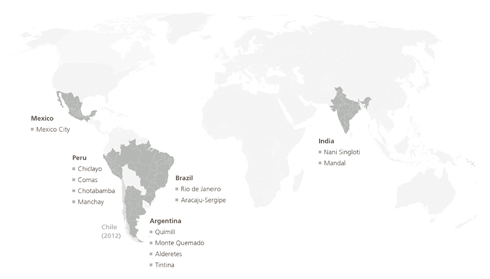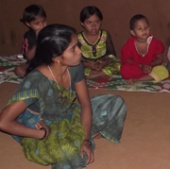 Abengoa
Abengoa
Annual Report 2011
- Corporate Social Responsibility
- People
- The Community
- Social development area
Achieving balance in the economic, social and cultural development of the communities in which Abengoa operates is a top priority for the company. Abengoa pays particular attention to the most vulnerable social groups, including children, women, and the elderly and disabled people; as well as underprivileged communities. The company conducts analyses to determine overriding needs and establishes channels of cooperation and development to provide assistance to those who are most vulnerable.
In 2011, Abengoa earmarked 3.7 M€ for the aid and assistance area, of which 0.1 M€ was allocated to Argentina, 1.0 M€ to Peru, 2.2 M€ to Spain, and the remainder to India and Brazil.

Learning and Physical Education Practices:
Everyone’s Right (LPEP)
The “Learning and Physical Education Practices: Everyone’s Right” (LPEP) program was created in 2005. The aim of the program is to provide assistance to and cooperate with exemplary institutions in supporting the most vulnerable social groups (children, women, the elderly, and the disabled) in communities where Abengoa operates.
The LPEP was launched in Argentina in the towns of Quimilí, Monte Quemado and Alderetes in collaboration with the Hermanas de la Cruz convent, and subsequently implemented in Tintina together with the Franciscan Sisters. Program presence extended in 2008 to include Peru, through centers belonging to the congregation of the Hermanas Josefinas de la Caridad sisterhood and the Nuestra Señora del Rosario parish in Manchay. In 2010 the program expanded to include Brazil in collaboration with the Hermanas del Buen Consejo congregation.
In 2011 the program spread to India through collaboration with Jesuit missionaries and the Hermanas Hijas de la Cruz congregation, specifically in the regions of Nani Singlioti and Mandal; the program was also implemented in Mexico, in this case in conjunction with Celamex, a Jesuit institution that has been serving people in marginalized situations for over 50 years. The LPEP Program will soon be deployed in Chile.

The LPEP works with vulnerable groups in four areas:
- Non-formal education area, involving, among other things, school support, follow-up and tutoring for conventional students and those with special educational needs, as well as adult literacy.
- Physical and sports education area, involving the promotion of children’s sports activities, and physical therapy for disabled and elderly people.
- Occupational training area, through which professional training is provided to members of the community where the program is carried out, as well as adolescents, and the disabled.
- Social protection and food safety area, where workshops are conducted on nutrition, health and hygiene, as well as tasks aimed at providing psychological support to children.

Peru’s first power linemen school
Abengoa has implemented the first power line operator school in Peru. This program seeks to recruit and train high-voltage tower assembly technicians from among people without experience in the communities in which the company operates within the country. Selected individuals will study for two months at the Senati technical school, and, once they have completed this stage successfully, Abengoa will recruit them for a year so that they can apply what they have learned. Abengoa will provide funding for the course through an agreement signed with the Inter-American Development Bank (IADB).
Ainhoa Arteta in concert for the San Rafael senior citizens residence
In March 2011, the foundation held a special benefit concert performed by renowned soprano Ainhoa Arteta accompained by Father Ayarra, ornanist of the chapel of the Hospital de los Venerables and Seville Cathedral. for the San Rafael senior citizens residence, which serves 49 senior residents in the care of the Hermanas Josefinas de la Caridad sisterhood in Dos Hermanas, Seville.

Methodology for measuring the impact of social action
Resources earmarked for social action must undergo an assessment of their effectiveness in order to concentrate social action wherever the community may obtain the best returns.
To this end, Abengoa has implemented a project intended to define a model for determining the tangible and intangible impact of the social action carried out by the company.
Abengoa began to devise a methodology for creating a simple and practical analytical tool in 2010.

The tool will enable the company to:
- Calculate value generated for stakeholders.
- Help improve the management of activities involving social affairs.
- Increase transparency.
- Demonstrate the effectiveness of investments in social activities.
- Determine intangible impact, as well as the effect on company reputation.
- Facilitate alignment of activities with business objectives.
- Enhance decision-making when investing in different initiatives.
- Facilitate application of the model to projects that are already in progress, completed projects or to plan out in which projects to invest.
- Facilitate verification by an independent third party in order to certify truthfulness.
The final phase of the procedure, consisting of the assessment of two pilot projects, was carried out in 2011. The chosen projects were the Vuela internship grant program and the LPEP program in Argentina.

© 2011 Abengoa. All rights reserved
